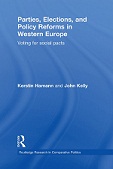Kerstin Hamann
 Professor of Political Science, College of Sciences
UCF Women Faculty Authors
Professor of Political Science, College of Sciences
UCF Women Faculty Authors The Politics of Industrial Relations: Labor Unions in Spain
Kerstin Hamann
2012
London & New York: Routledge
The Politics of Industrial Relations provides a comprehensive analysis of Spanish unions from the Franco dictatorship until the present. It builds on industrial relations, comparative politics, and political economy literature to investigate the trajectory of Spanish unions. The book analyzes unions as political actors, that is, their interaction and involvement with governments, political parties, and nationwide policy-making processes to explain why Spanish unions appear in some ways as atypical in West European comparison. The development of Spanish unions and industrial relations is framed in a historical-institutionalist approach while also taking into account globalization and Europeanization processes. Using the case of the Spanish transition to democracy, the book demonstrates that the historical sequencing of institutional reforms in the political and industrial relations arenas holds significant and long-lasting consequences for the nature of unions and labor relations. The book concludes that by understanding unions as political actors, the history of Spanish unionism and industrial relations institutions is more easily accommodated than looking at unions as industrial actors alone. Comprehensive in its theoretical scope and empirical depth, The Politics of Industrial Relations presents Spain as an anomaly, and thus as a test case, for a multitude of theories developed in the political economy and industrial relations literatures.
Parties, Elections, and Policy Reforms in Western Europe: Voting for Social Pacts.
Kerstin Hamann and John Kelly
2011
London & New York: Routledge
Social pacts – policy agreements between governments, labor unions and sometimes employer organizations – began to emerge in many countries in the 1980s. The most common explanations for social pacts tend to focus on economic factors, influenced by industrial relations institutions such as highly coordinated collective bargaining. This book presents, and tests, an alternative and complementary explanation highlighting the electoral calculations made by political parties in choosing pacts. Using a dataset covering 16 European countries for the years 1980-2006, as well as eight in-depth country case studies, the authors argue that governments’ choice of social pacts or legislation is less influenced by economic problems, but is strongly influenced by electoral competition. Social pacts will be attractive when party leaders perceive them to be helpful in reducing the potential electoral costs of economic adjustment and wage restraint policies. Alternatively, parties may forgo negotiations with social partners and seek to impose such policies unilaterally if they believe that approach will yield electoral gain or minimize electoral costs. By combining the separate literatures on political economy and party politics, the book sheds new light on the dynamics of social pacts in Western Europe.


